The Sandwich Generation: How to Thrive Despite Multigenerational Squeeze
For the sandwich generation, ironically, life is not always a picnic. The sandwich generation comprises of middle-aged adults (age 35 to 59 years) who care for their aging parents (or older family members/friends) as well as their own children (younger relatives/other dependents).
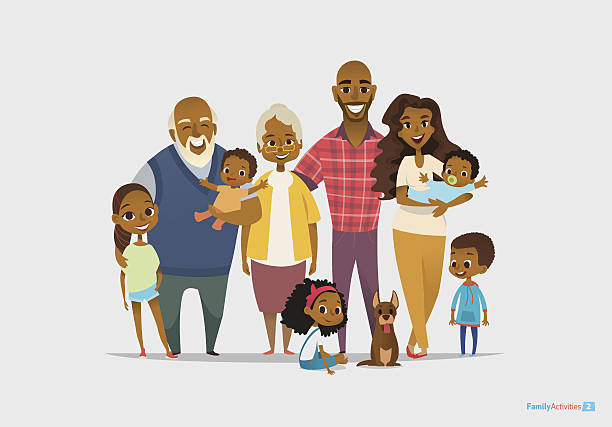
Photo credit: Family Activities 2.
The idea of the sandwich generation arose in the late 20th century as average lifespan increased and childbearing age became older; concurrently, the percentage of wives working outside the home rose from 23% in the 1950s to 39% in the 1970s and then 61% by 1995. This meant that women (who are the primary caregivers in most societies regardless of whether they work outside the home or not) were more often in their middle age while being in the position of caring for small children and aging parents at the same time all while balancing work/career responsibilities.
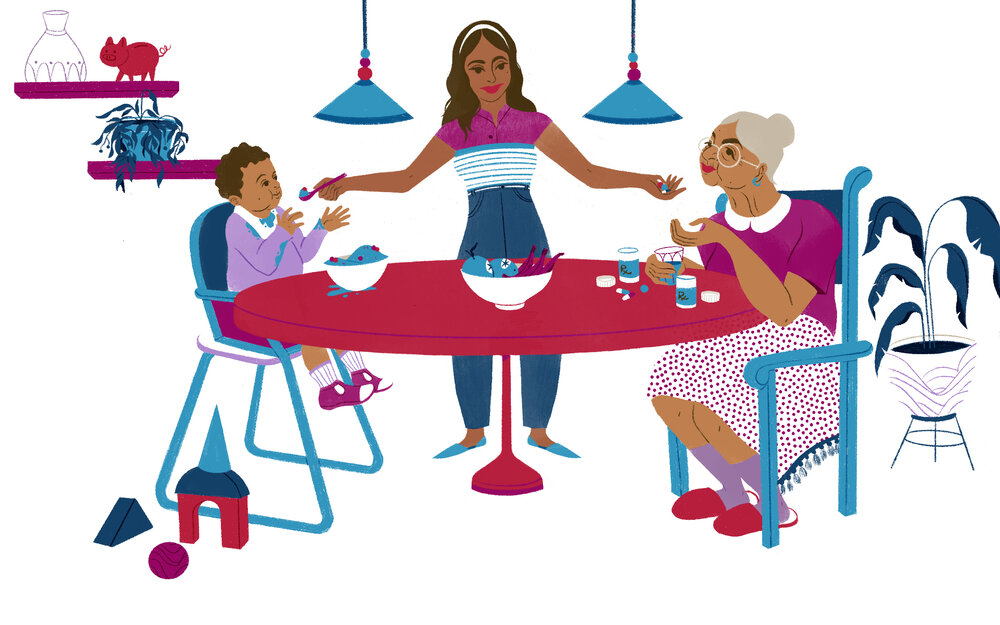
Photo Credit: Carmen Deñó carmendeno.com
According to an article in Today’s Caregiver, “these ‘sandwiched’ people become responsible for caring for their parents and their children at the same time. They may help their loved ones with daily functioning, medical services, general supervision, medication administration, as well as aiding in financial, legal, and emotional difficulties of their loved ones as well as themselves.” According to a Pew Research Center study, Americans in their 40s are the most likely to be sandwiched between their children and an aging parent (54 % of them have a living parent age 65 or older and are either raising a child younger than 18 or have an adult child they also support). This is this the Traditional sandwich generation.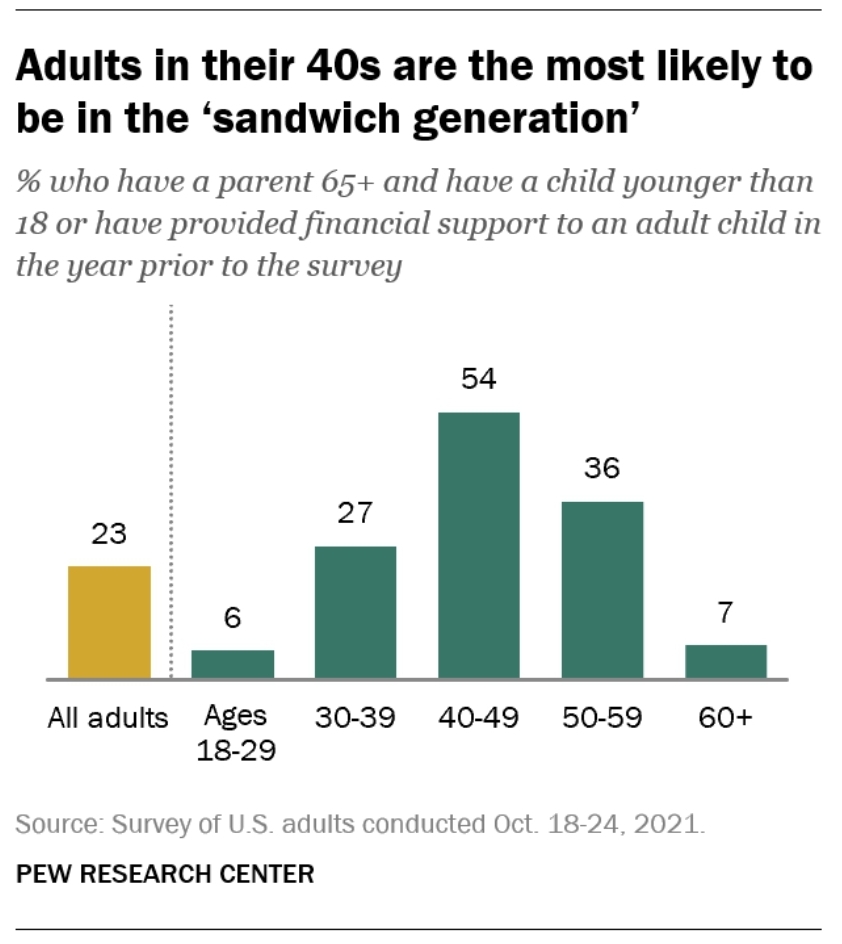
There are other sandwiches on the menu:
The Club Sandwich Generation are older adults (50s to 60s) who are wedged between their older parents, their adult children who are in their 30s and 40s and then their grandchildren OR young adults (30s-40s) with young children, aging parents, and grandparents.
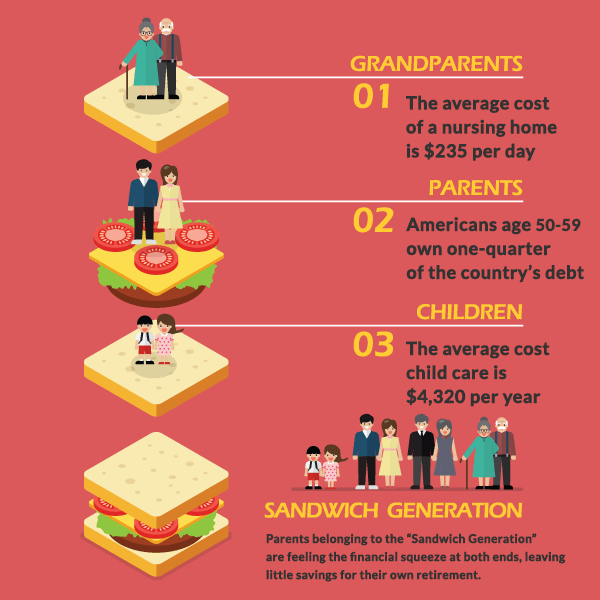
Photo Credit: InCharge Debt Solutions
The Open-Faced Sandwich is anyone who is involved in elder care.
The Stressors the Sandwich Generation Face
Statistics show that the financial burdens that come along with being a part of these sandwich generations are rising. The average child costs $230,000 to raise in the U.S., and caring for an aging parent costs $140,000 on average. A 2022 study of yearly, monthly, daily, and hourly caregiving costs provided average expenses per state and type of care; depending on whether or not the need was in-home care versus community and assisted living to nursing home residences, the numbers were quite steep—some exceeding six figures annually. Even before formal care options, these overwhelmed caregivers are reportedly spending an average of $10,000+ per year providing for both their children and parents.
Generation X (my generation) is particularly affected. Despite Gen X being greater employed, they have taken a reduction in savings and some have increased their debt significantly due to their caregiver responsibilities. Only 55% of Gen Xers can count on retiring with enough money, a significantly lower percentage when compared to Millennials, at 67%. In addition, 43% of Gen Xers say they need to catch up on their savings, while 49% are worried about running out of money once retired.
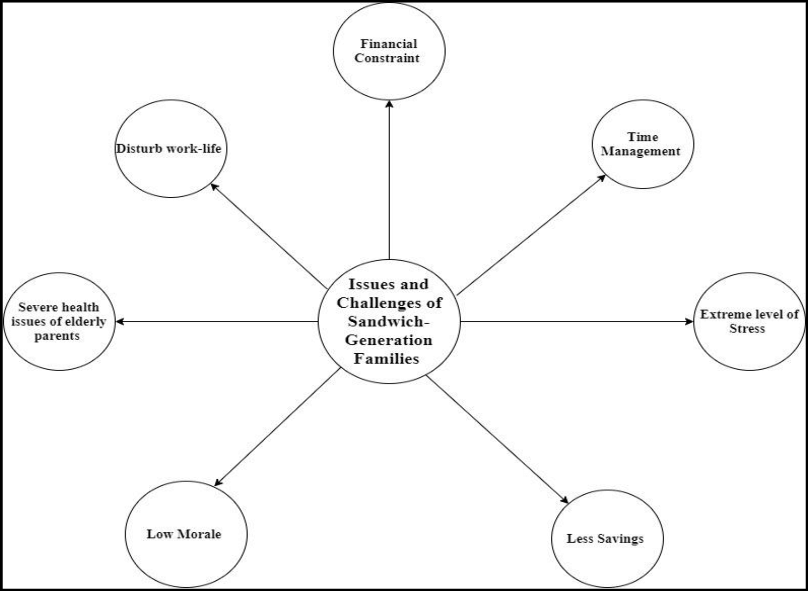
Apart from the financial issues, studies have also shown that the risk of depression, isolation, feelings of guilt and general burnout are quite high amongst members of the sandwich generation. Surveys report that those who are part of the sandwich generation struggle with juggling their families, other relationships, their jobs/careers and time for themselves. Those caring for both parents and children get 21 less minutes of sleep per day and spend about 15 extra minutes per day engaged in running errands and doing house chores. If the multigenerational caregiver is a mother, she will typically spend 45 more minutes per day than her father counterpart helping her parent or child(ren). With current rates of inflation leading to rising medical bills, elder care services, funeral costs, tuition, and general household expenses for all, caregiving can be financially, emotionally and mentally taxing, causing chronic anxiety and stress.

Photo Credit: Better After 50
So, how can one overcome these challenges and transition from the fate of the stale, airport kiosk-resident, cold and sorry-looking sandwich to the destiny of a gourmet, flavorful, hot-off the panini-press sandwich that is worthy of Michelin stars?
Here are ten tips on how to thrive in the sandwich generation:
-
Build a Trusted Circle of Support
Sandwichers often have a challenging combo of no time and little money. Those experiencing this kind of psychological and financial strain can prioritize their own wellbeing by asking for help from others. But, not just any others—I am talking about a circle of support made up of family members and/or friends, whenever possible. About six-in-ten adults in the Sandwich Generation live near extended family or friends, allowing potential opportunity to share the burden with other relatives or trusted friends in their circle. This is not a time to be a superhero—please bear in mind that self-martyrdom is so played out (seriously!)

My Ace: The incomparable Mrs. Josephine Chike
The Family Caregiver Alliance reports that women provide unpaid, informal care that ranges from $148 billion to $188 billion annually. This amount of work can quickly translate to caregiver burnout, leaving family caregivers feeling exhausted, depressed, and even getting ill more often than their peers. The great news is that studies have shown that, if family caregivers receive support from others, they are able to have the time for self-care, reducing their chances of feeling the effects of burnout.

My Inner-Inner

The 5 to my 6

My Sister from another Mister
Caregiving tasks can be distributed and delegated among family members. There are also times when a close friend is as close as a family member and may be able to fill in some gaps of care from time to time. Every little bit counts and helps. If you are a primary family caregiver, a sandwicher in particular, do not be afraid or ashamed to ask for help. Often, you will find that your family, friends, and neighbors are ready to rally around you to provide the support you need. However, if you do not ask, your network will not have the chance to offer their help.
-
Outsource—whenever possible.
Seek out professionals or organizations that address your unique challenges. Caregiver tasks can also be provided by hired professionals (whenever possible/affordable) to further lift the burden off the primary family caregiver. This often requires some level of means for sure, however it is not so uncommon these days to outsource both child and elder care as more and more homes require two incomes. You may not be able to pay for full-time child and/or elder care, but you may be able to get some part-time support or just intermittent caregiver respite support that can still be so beneficial. Check out companies like care.com, or neighborhood Facebook groups or other local community listserves to search for qualified individuals that can be hired. Of course, it is crucial to ensure that you properly and thoroughly vet any and all individuals to whom you plan to entrust the care of your vulnerable loved ones.
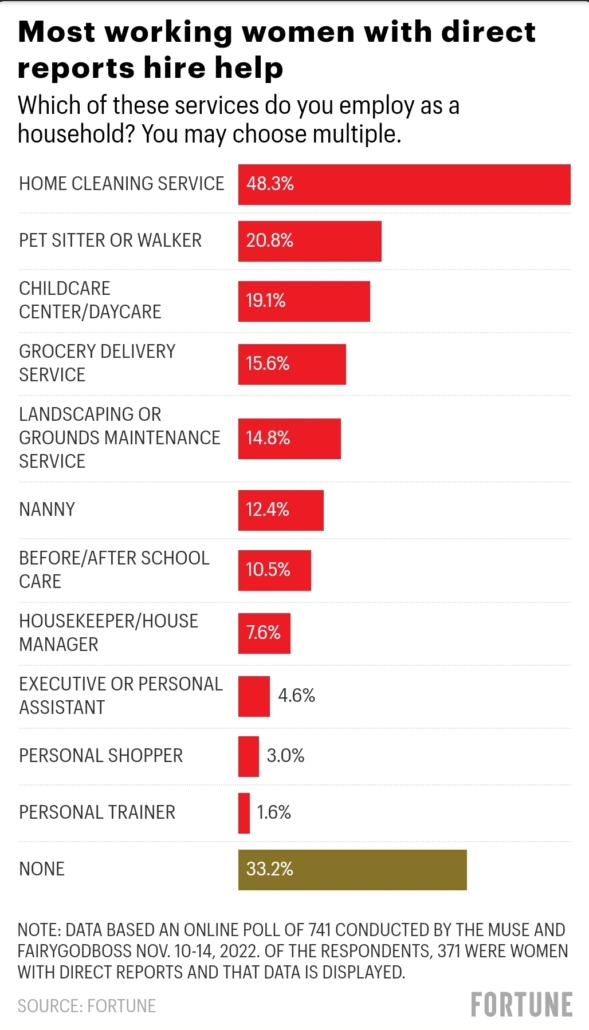
Many other tasks can be outsourced to decompress overburdened schedules and provide some relief from the multigenerational squeeze. Tasks such as grocery shopping, cooking/meal prepping, laundry, house cleaning, odd jobs around the house, lawn care, tutoring the kids, etc. You may not be able to afford all of those things all at once, however, you may be able to afford one or two—pick the one or two that drain your soul the most and splurge toward it/them. The difference will be profound.
-
Self-Care is a Must-Have not a Nice-to-Have
During every flight, you are instructed to put on your oxygen mask first before helping any dependent on the flight. The airline industry is not out to promote and encourage self-centeredness. Their instruction is actually lifesaving because if you run out of oxygen yourself, you can’t help anyone else with their oxygen mask. Or put more simply: if you die, you can’t help anyone else and others dependent on you may likely also die.

Photo Credit: Dreamstime.com
Similarly, if you don’t take care of yourself, especially as a sandwicher, you can experience unhealthy stress, fatigue, reduced mental alertness, health problems (like hypertension, obesity, and diabetes), anxiety, frustration, insomnia and even death and all your dependents stand to lose—a LOT. 
This is a great time to put a plug in for therapy. A licensed, accredited and experienced therapist can help you with a range of issues like depression, anxiety, grief, trauma, relationship issues, etc. BetterHelp is an app that matches you to the best therapist for you—you answer a few questions to find a licensed therapist who fits your needs and preferences. You can talk to your therapist by text, chat, phone or video conference and you get to schedule live sessions at your convenience. Click here to check out BetterHelp. 
How do I self-care? I arrange my schedule and create my budget to accommodate regular spa visits for various treatments like aromatherapy massages and body wraps; I wake up earlier than my household every morning to pray, exercise and just to have some me-time before the hustle and bustle of our ever buzzing home and my ever hectic daily schedule; I find time in my day to listen to audiobooks or my favorite podcasts as I commute solo to and from work every day to stay engaged, enlightened and entertained; I buy gifts and treats for myself regularly to celebrate achieving personal goals or just because; I try my hardest to prioritize getting enough sleep—I could go on and on.


Self-care does not necessarily have to be expensive; however, whatever you invest in it will always yield rich reward. You have to be intentional (at times militant–LOL) about it to achieve good self-care.
-
Get and Stay Organized
The seemingly nonstop demands on sandwich generation caregivers can be overwhelming, but staying organized can be quite helpful. Planning regular family meetings can help you harness your circle of support effectively and efficiently to accomplish all your caregiver tasks. Talk about what is going on, and what you need help with in the short, medium, and long term. You are more likely to get the help you need if you outline specific tasks. For example, ask if someone can pick up Mom’s prescriptions on the 15th of every month from the local pharmacy, or team up with a fellow parent to take turns getting your kids to and from a shared weekly activity (sports practice, church program, or school activity).

Photo Credit: Getty Image
You can organize your family members and/or hired professionals with a synced calendar that details all the key tasks you need to accomplish daily/weekly/monthly, as well as all the appointments for all the members of each layer of your multigenerational sandwich. You can also use apps such as MealTrain to organize meal drop-offs or other caregiver apps that can assist with organization. Whatever you can organize to automate will go a long way in reducing stress.
-
Anticipate and Prepare for Financial Challenges
As difficult and/or impossible as it may seem or be, it is crucial to fund yourself (and your retirement) first. Even as tight as budgets can be during the sandwich years, prioritizing saving even just a little bit as early as possible will help you harness the power of compound interest over time. As your financial status improves with age and experience, your savings and investment rates should increase accordingly. Additionally, having an emergency fund is key—an emergency fund is a sum of money that you set aside for unplanned events like major illness or injury, loss of a family member or loss of primary income. Life can be very unpredictable–the odds of having a life emergency is quite high and it can be destabilizing without a buffer such as an emergency fund.
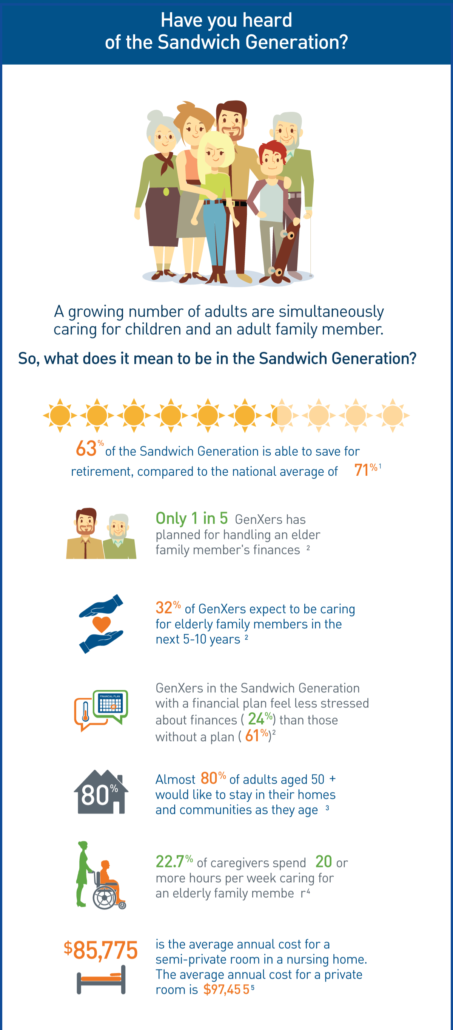
Photo Credit: PNC Bank
It is also important to look for and choose a job that will provide fringe benefits (not just direct compensation) that put you in great stead. Benefits like insurance—health, disability and life—packages, college tuition benefits, dependent care support, flexible spending accounts or health savings accounts, free financial advisor or estate planning services.
Stressing out about finances is common when caring for an aging parent, but you can feel more confident by being as proactive as possible. Have a money talk with your parents to assess their preparedness for future challenges and to ensure their estates are well organized. It can be very difficult to talk to your parents (or anyone really) about planning for their own deaths, but it is naïve (and dangerous) to live life as if your parents are going to live forever.
You can also speak candidly with your parent’s physician(s) as you attempt to understand what health challenges could arrive in the near and distant future. Armed with such information, you and your family members will be able to develop goals and create timelines that can assist with financial planning and leave you better prepared for the twist and turns of life.
Please check out this article by Fidelity about financial planning for the sandwich generation: Click here.
-
Don’t Miss Out on Quality Time with Your Loved Ones:
It is not easy being pulled in several different directions. However, do not let your caregiving duties prevent you from spending meaningful time with your children and your parents. Many family caregivers often lose themselves in the caregiving role and end up missing the opportunity to relish in their mother/father or daughter/son roles and relationships.

Statue of Liberty, April 2022

Niagara Falls with my boys, April 2022
Carve out regular visits or dates where you leave all caregiving duties aside and, instead, spend that visit enjoying the company of your loved ones: taking a walk, looking at a photo album, reading a book, going to church, going to a movie or a museum, taking a short trip, etc. You will find that such moments will leave you feeling refreshed, reenergized, and ready to take on your busy calendar.

Sandwich Quality Time with my in-laws and kids
Such quality time can be enjoyed multigenerationally and can be the very definition of making lemonade when life hands you lemons.
-
Encourage Fellow Sandwichers
It is so important to bear in mind that you are not alone when it comes to enduring multigenerational squeeze. Often times your spouse, your friends (personal and work peers) and many others around you are experiencing the same squeeze. Taking the time to support and motivate each other can be so mutually beneficial.
For example, my husband is a fellow sandwicher and we really look out for each other all the time—we encourage each other by complimenting good and caring deeds, we get special treats for each other regularly just because, we dream and plan together, we support each other’s families in different life events (weddings, birthday celebrations, illnesses, deaths), and we share our caregiver tasks according to individual strengths and interests; we apportion them as evenly (and as gender-neutrally) as possible to make sure neither one of us gets swamped or overwhelmed by his or her share.

Father’s Day Brunch spread for my Hubby
Another example: My bestie (also a fellow sandwicher) and I have a regularly scheduled videoconference date for 1 hour on the first Sunday of every month to just catch up about life, to share our hopes and dreams, and to help each other troubleshoot various issues. I find each session so life-giving and I so look forward to them—my bestie has shared that she feels the same way.

Similarly, my secondary school (high school) classmates have a WhatsApp group—we use this platform to keep in touch with one another, celebrate our successes and key milestones, to lend each other support on individual projects, and to console and assist each other during difficult times. We have a bereavement fund to which we each contribute such that each member who has lost a loved one gets a set sum of monetary contribution from the group. A lot of us are at the stage where our parents are getting older, sicker and are passing away—we are leaning on each other and bearing each other’s burdens. When we meet each other at our common points of need, we lighten the load for one another.
-
Learn to Say No
Saying no is so crucial for creating and maintaining healthy boundaries in personal, family, and work life. It is important to really understand and maintain focus on your personal and professional priorities so that you can confidently say no to invitations to participate in activities/work/opportunities that do not fit your priorities or help you attain your goals. Saying no is a skill set that every sandwicher must attain to avoid burn out. Of course, you cannot say no all the time, however it is important to recognize the importance of turning opportunities down from time to time—it invites less chaos and unnecessary work/useless tasks into your life. Saying no is a muscle that requires training and regular practice to get strong.
Check out this article by Business insider on how to say no to extra work at your job and avoid burnout.
-
Maintain Perspective
Remember: This, too, shall pass. Your time in the sandwich generation will not go on forever. Sadly, transition out of the sandwich is propelled by a loss—loss of a parent or older relative/friend or a child or children growing up and leaving home and/or becoming independent. It is important to count your blessings through the difficult parts of life and to relish the beautiful moments by being mindful and not taking them for granted.
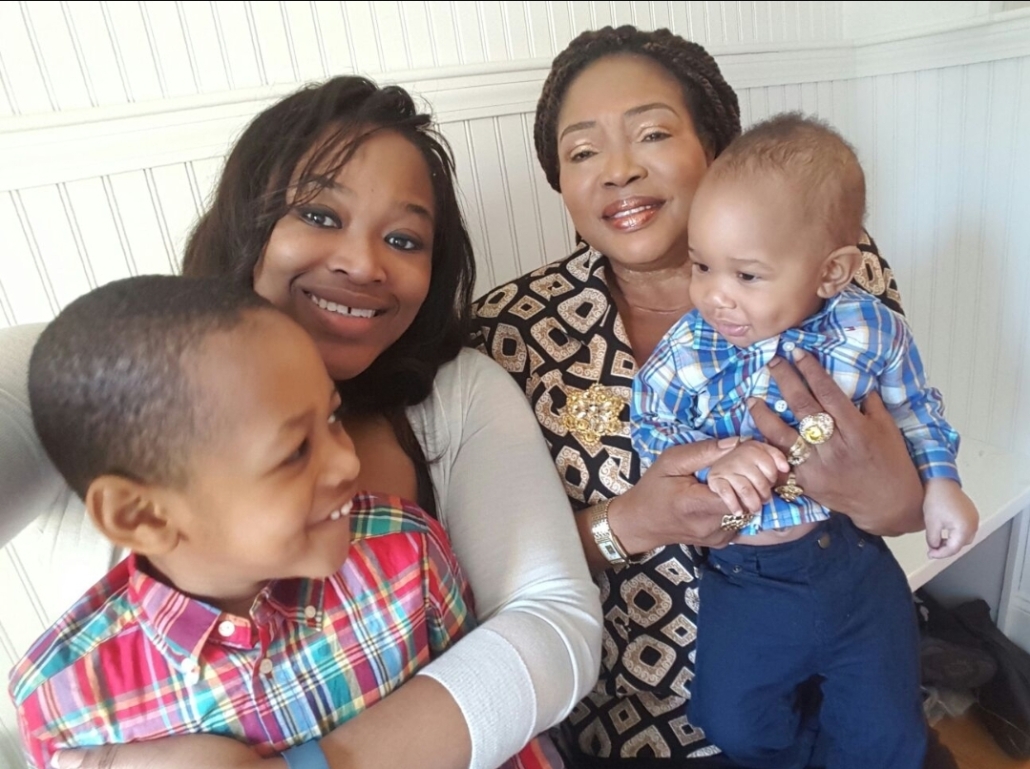
Cherish the Sweet Moments

Oh! How the Years Go By
-
Faith
The Christian Bible in the book of Hebrews (Chapter 11, Verse 1) tells us that faith is the substance of things hoped for, the evidence of things not seen. Believing in something greater than your immediate natural life experience can be a very powerful source of inner peace and can help you cope with stress. My religious faith provides me with meaning and purpose in my life; faith brings with it to my life some key cousins, hope, love, and peace—these are actually the fruit of the Holy Spirit. The Bible has so many verses that teach coping skills and provide crucial advice on how to deal with anxiety and fear (for example Matthew 6: 25-34, Romans 8: 35-38, Jeremiah 29:11, 2nd Timothy 1:7, etc.) Additionally, prayer physically and mentally calms me down. I can (most definitely) bear witness to the power of prayer in my life.

Faith also unites us with others and having a shared faith system fosters a sense of community that often brings people together in a mutually beneficial and supportive way. In fact, a Pew research center 2019 study found that people who are active in religious congregations tend to be happier and more civically engaged than either religiously unaffiliated adults or inactive members of religious groups.
I hope you have found some of these tips helpful. Please leave me a comment below and feel free to suggest your tips that are helping or have helped you thrive in your era of the sandwich.
Love and best wishes to you all,
–Chichi





Wow Chi Chi. That is beautiful and great advice! I was there with my parents and always based my decisions and actions on being able to put my head on the pillow at night. Ty! Miss u
Thank you so much Ms. KG!! I totally hear you re: making decisions with the ultimate goal of just getting to bed at night. Thank you for taking the time to read this post and to leave me a comment 🙏🏾💖
Wow Chichi, this is a great read, it hits all the points that most women in my age group are experiencing. I find this to be in-depth and insightful…it is nice to know there is a name for this “phase”, lol. Thank you for sharing!
Thank you so much for reading the post and taking the time to leave me feedback. So many people have been expressing surprise and relief that what they are going through actually has a name and that they now feel more empowered to do something about it. I am so glad to be of any help. All the best my dear 🙏🏾💖
Hi ChChi, Long time…..Great read!! I learnt something new “Sandwichers” Leaning to say No and enjoying Me time especially without feeling guilty is a ++. My Faith keeps me going and I believe you cannot please everyone. Thanks for posting. I will have to do a little catch up on previous posts. Be blessed!🙏🏾🙏🏾
Thank you for checking out my post, Eva. You are too kind. I am so glad you found the article helpful. Thank you for the feedback 🙏🏾💕
I didn’t even know there was a name for what I am, lol. Very good advice Chichi. I particularly like those two about sharing the responsibility and self care. Truly would help to ease the stressors.
Awwww Ann-Maria 💖💖💖💖 Hang in there Sis–it is so not easy. Thank you for taking the time to read the post–I am so glad you found it helpful. So many people have been reaching out to me expressing relief that they now know that what they are living through has a name 😁 Yes, a circle of support is key to stress management and avoidance of burnout. Thanks again 🙏🏾💖
I loved reading this!!
Thank you so much, Nicole, for taking the time to read the blog post and leave me a comment. I really appreciate you. Best wishes 🙏🏾💕
Poignant post, Chichi. Your point about asking for help resonates with me – sometimes I feel I can handle it, but I’ve gotten so much support from loved ones and professionals to help me navigate the unpredictable situations I’ve encountered.
Thank you so much, Udo. Yes, support is key my sister. It is so good to have lovely humans like you firmly in my corner. 🙏🏾🥰